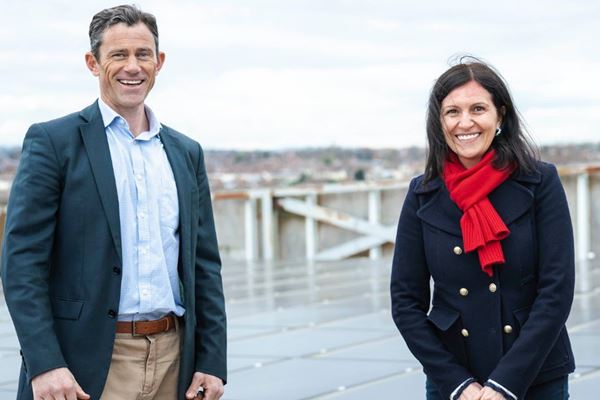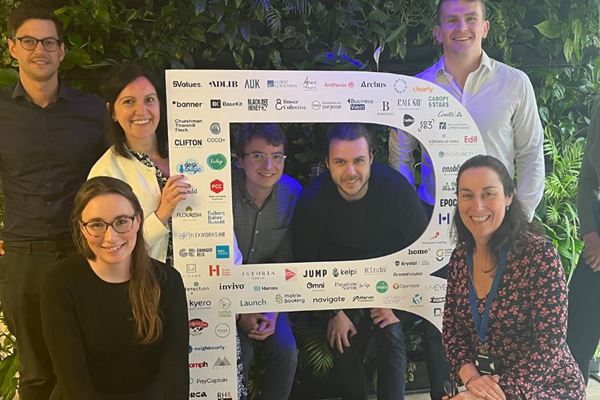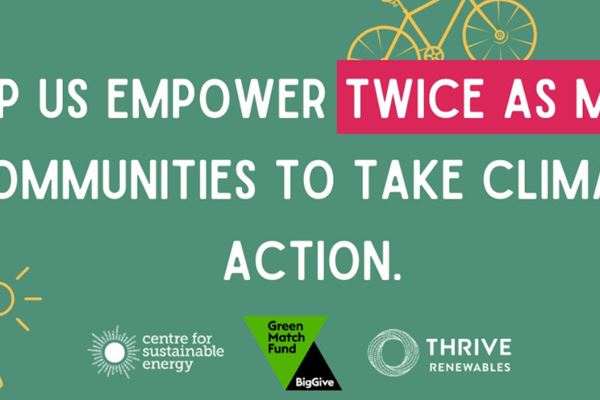Peter Weston, Non-executive Director at Thrive Renewables
Peter has a passion for connecting people with renewable energy to make a difference in the world.
This passion extends to everyone around him, from his family and friends, to the UK renewable investment community, and to the small off-grid entrepreneurs he works with in Africa.
With a 20-year career as an investor, lender and strategic adviser to different organisations in the renewable energy sector, we are interested to find out what makes Peter tick and where the next chapter of his renewables adventure will take him.
Peter, what inspires you to make a difference?
I have two children aged 14 and 11 and they’re very important to me. I want them to grow up in a clean energy world and renewables are a big part of that. I also want to broaden their minds and encourage them to pursue what matters to them.
My son likes all things related to gadgets and science and told me when he was 9 that that he was going to create a solution for perpetual energy. It is good to dream big! Last year I brought him a small solar lantern and charging unit from Kenya which he now uses to do his homework and charge his phone. Hopefully this can be the first step on his sustainable energy ladder.
My family recently travelled with me to Tanzania where I work with local companies to provide off grid community energy. During the trip we visited a social business assembling and distributing solar lanterns to show my children how some local women live and work and to get them engaged. They have now decided to raise funds for charitable causes of their own. While they did not opt for renewables - my son went for Water Aid and my daughter chose to protect chimpanzees – I am pleased they too are trying to make a difference.
How did you come to work in renewables?
I followed a pretty unconventional career path. I started in financial journalism, followed by market research, electricity trading and energy banking. Energy financing and investment was a constant theme throughout. In the early days, I worked for GE Capital and others, acting as the principal investor and lender in renewable and other energy projects. Later on, I switched to the energy manufacturing side, working for the likes of Siemens Wind Power to increase sales of wind turbines by sourcing financing for their customers.
While I really enjoyed working for these large energy companies, I have always had a soft spot for smaller organisations. Joining Thrive Renewables (Thrive) as a non-executive director in 2011 exposed me to smaller, more localised renewable projects. Becoming a trustee of the NGO Renewable World provided me with insight into even smaller, micro-scale projects, this time in developing countries. And then last year, I joined the management team of Energy 4 Impact where I get paid to do something I love: working with small entrepreneurs on renewable energy in the challenging markets of Africa.
Tell us more about your work in the renewables sector?
In my day job, I am Investment Advisory Director for Energy 4 Impact. We are a non-profit organisation that seeks to alleviate poverty in Sub Saharan Africa by increasing access to energy for under-served rural communities. Currently around 6 out of 10 people in Africa lack access to electricity - that is nearly 650 million people. Well over half of the businesses there say access to reliable power is a major constraint on their growth. And there is a big urban-rural divide, with access in urban areas being nearly 70% compared to just 15% in the countryside.
We provide advice to small and micro off-grid renewable enterprises, including start-ups and more mature growth businesses. My role is to advise them on business plans and capital raising and to work with local financial and industrial partners to provide financing for their end customers. Our business clients include suppliers of solar lighting and energy products, solar irrigation pumps, cold storage units, biogas digesters and clean cooking solutions. We also support providers of ancillary services such as remote metering and payment systems, which are critical for the sustainability of renewable businesses in remote areas.
Like Thrive, we do a lot of work with small renewable project developers. However, the challenges involved are very different from the developers supported by Thrive. Most of the “mini-grids” Energy 4 Impact supports are very small (I.e. a few kilowatts in size versus the megawatt projects of Thrive) and serve only a few hundred or thousands of people. Because most of the projects are not connected to the national grid, they supply energy directly to local communities where demand for electricity is often uncertain. In the case of Thrive’s projects, we already have a good idea how much and to whom we are selling power.
In my part time, I am a trustee for Renewable World which develops community micro renewable projects in South Asia and East Africa. These include hydraulic and solar water pumping projects in the hillside communities of Nepal and solar mini-grids in remote fishing villages in Kenya. My role is to oversee and support programme management and fund-raising. Like Thrive, Renewable World works closely with local communities to ensure the projects are sustainable from a social, business, financial and environmental perspective.
What else are you doing?
A few years ago I became an (unpaid) advisor to Pearlstone Energy, a UK electricity demand response aggregator start-up. They face many of the same challenges in terms of market development and funding that my clients in Africa face, albeit in a very different market context.
Demand response is an emerging market that allows commercial industrial consumers such as data centers and medical facilities to support the National Grid by reducing their electricity usage during peak periods and getting paid for doing so. While the market is currently more risky than traditional generation, the opportunities for investors and potential benefits for consumers in terms of lower cost electricity and reduced CO2 emissions are clear.
How do you see the future?
The cost of key components such as solar panels and batteries has fallen dramatically in recent years, creating new opportunities for investors. In developed markets such as UK, we are seeing the emergence of new businesses in energy storage and demand response, which dramatically improve electrical system efficiency. In some developing markets such as East Africa, we are witnessing a solar revolution facilitated by remote metering and pay-as-you-go technologies which allow those unable to afford the high upfront cost of electrical services to pay in small instalments. All in all, it is a very exciting time to be in renewables.
About Peter Weston
- Board Member of Thrive Renewables (formerly Triodos Renewables) since 2011. Chair of Operations and Health & Safety Committee.
- Director of Investment Advisory at Energy 4 Impact (formerly GVEP International)
- Trustee of Renewable World
- Visiting lecturer at ESCP, a European business school
- Previous management roles with GE Capital, Siemens Wind Power, MAN Diesel & Turbo, Westdeutsche Landesbank, Aquila Energy and Osaka Gas
- Journalist with Euromoney Publications and freelancer for Financial Times



